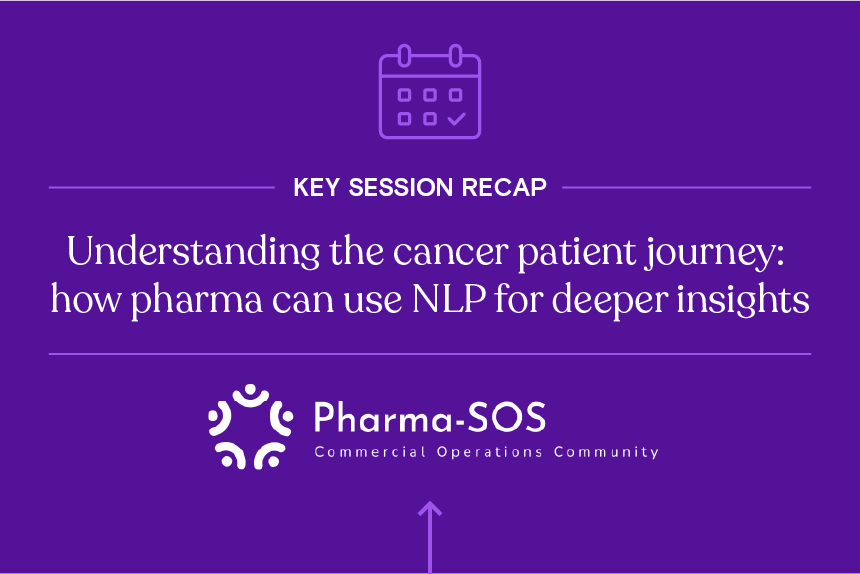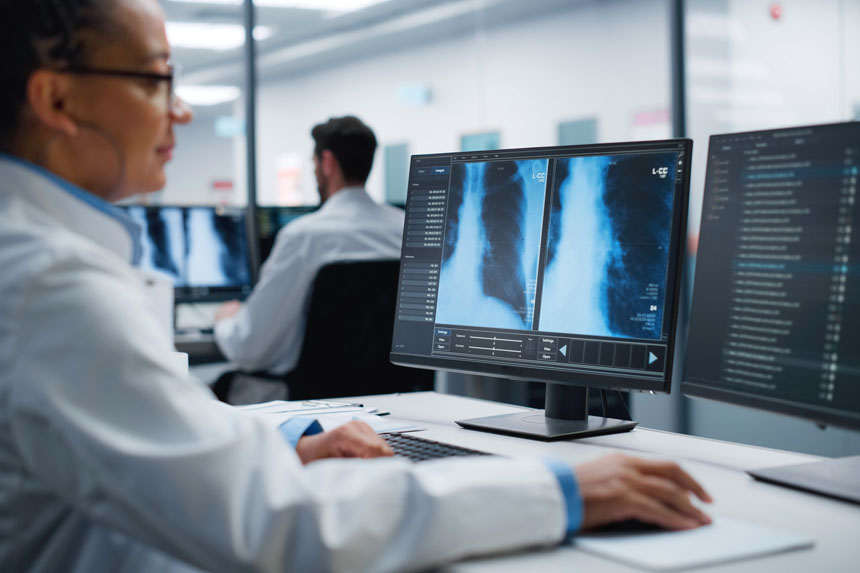Artificial intelligence is redefining life sciences, but how can we get there faster?
Nov 1st, 2023

To say that artificial intelligence (AI) will be a game changer for the life sciences industry is an understatement. Biopharma and medical device companies are using AI and machine learning (ML) to create more effective drugs, make robot-assisted surgeries possible, identify treatment-ready patients, save lives, and so much more.
While life sciences companies have used AI for years, the explosive arrival of generative AI tools like ChatGPT and Midjourney in 2023 ignited conversations about how the technology is used. There are some potential risks with AI, including privacy and security, the quality of the data, and the impact these tools will have on the workforce.
Despite the risks, the momentum behind AI in life sciences is building fast, and the market is ripe with untapped opportunities. To remain competitive, life sciences companies must embrace AI. We explore why in our latest AI in life sciences intelligence report, but if you want an overview of AI trends in life sciences, including the use cases and challenges you should be aware of, then read on!
Leaders are enthusiastic about the AI movement, but many remain cautious
To get a better understanding of how biopharma and medical device companies think and feel about AI, and how they’re integrating it into their strategies, we conducted a survey and interviewed a handful of leaders at life sciences organizations in the summer of 2023.
To summarize, nearly all survey participants and interviewees were excited about what AI could do for healthcare. A sense of caution counterbalanced their enthusiasm, as many respondents shared that there is still a lot to learn about AI’s potential positive and negative impacts of AI.
From the chart, we can see that many participants across biopharma and medical device companies rank their understanding of AI and ML as a “1,” meaning that they have a lot to learn about the technology’s full potential.
No one considered themselves an AI expert (Level 5), which raises questions about how difficult it is to understand the capabilities of AI and whether the market has enough knowledgeable workers to leverage the technology to its fullest potential. Survey participants felt that AI’s complexity and a perceived lack of skilled talent in the market were among the biggest obstacles to broader AI adoption in the life sciences industry.
While some biopharma and medical device leaders feel that they have more to learn, that hasn’t stopped major players from investing in AI. Half of the 50 largest pharmaceutical companies have entered into partnership or licensing agreements with AI companies as of 2023, and the value of the market is estimated to reach $7.09 billion by 2028. As we explore in more detail in our report, life sciences leaders acknowledge the risks and concerns surrounding AI, but feel that the potential benefits outweigh the negatives.
Which use cases should life sciences companies focus on?
Biopharma and medical device companies are using artificial intelligence to help save lives and improve patient care. Still, there are also plenty of opportunities to use the technology in other applications, too. AI and ML can help companies streamline daily operations, optimize time spent researching and analyzing data, and compete more effectively in the market.
Three life sciences use cases that benefit the most from AI include:
Mining unstructured data. The vast majority of data generated by the healthcare industry is “unstructured,” such as an X-ray, an electronic health record (EHR), or clinical notes. Unstructured data are valuable because they capture the severity of a patient’s condition. The problem, however, is that they are often amassed quickly and haphazardly, making any attempt at analysis difficult and time-consuming. AI takes the heavy lifting out of reviewing patient data and saves researchers valuable time searching for trends and patterns. A study by the Fred Hutchinson Cancer Center used a natural language processing (NLP) service from Amazon to review 10,000 sources of unstructured data per hour. Using this tool slashed the time needed to enroll relevant patients in a clinical trial from hours to seconds. Predictive analytics can also leverage unstructured data to support strategic thinking and help organizations predict shifts in the healthcare landscape.
Supporting earlier disease diagnosis. Advancements in AI and medical imaging are making faster and more accurate disease diagnosis possible. In one study, researchers found that an AI was twice as accurate at positively identifying precancerous changes that would require medical attention than doctors were. The AI could also predict seven years into the future the patients who would likely develop a precancer and those who wouldn’t. Not only can earlier disease diagnosis be lifesaving for cancer patients, but it can also help providers develop more targeted treatment plans, reduce medical errors, and lower the risk of patients developing long-term complications.
Identifying patients for clinical trials. Clinical trials offer biopharma companies valuable information but can be difficult to pull off due to the time it takes to find the most suitable patients. Reports indicate that about 80% of all trials fail to meet their original enrollment deadline, and 55% of trials are terminated for failure to achieve full enrollment. AI can help researchers conduct more successful trials. ML algorithms, NLP, and optical character recognition all help an AI quickly parse large datasets for the right patients, reducing patient screening time and increasing enrollment, sometimes by 34% and 11%, respectively.
Survey participants shared their concerns and roadblocks to AI adoption
Despite the tremendous potential that AI can have within the life sciences industry, there are some challenges and concerns that need to be addressed. The market is moving fast, and many companies are investing in AI tools, but these obstacles should be considered as we try to predict the impact AI will have on healthcare. Three of the most important roadblocks are:
Privacy and security. Healthcare organizations are attractive targets for hackers and cybercriminals, which can devastate patients and providers. Data breaches result in longer lengths of stay at hospitals, delays in procedures, and higher complication and mortality rates. AI is no more secure against these attacks than any other form of technology—so life sciences organizations must remain vigilant of their security solutions and where network vulnerabilities lie.
Data quality. An AI is only as useful as the quality of the dataset used to train it. To squeeze the most value out of an AI system, life sciences companies must ensure their data is accurate, error-free, unbiased, and collected from diverse sources. Overcoming system biases in healthcare will be challenging. The road ahead is long, but survey participants believe that implementing standardized procedures for data collection and involving subject matter experts to check for equity and inclusivity is a strong starting point.
Ethical concerns. A common concern held among the public is that AI will make some human jobs obsolete. After all, AI can do in seconds what people need hours or days to accomplish. Despite these feelings, many survey respondents shared their optimism about the future and believe AI will create more jobs and potentially create new ones. AI technology is still in its infancy and is nowhere near capable enough to replace everything a healthcare provider does fully. Likely, AI will instead be used to support providers, helping them focus more on patient care and less on burdensome administrative tasks that cause stress and burnout.
More widespread collaboration between providers, AI vendors, and biopharma and medical device companies will be key to overcoming these barriers to adoption. What’s more, collaboration will help to find the areas where AI will be most useful, allow for the sharing of best practices, and potentially increase access to higher-quality data.
Life sciences companies must embrace AI
Artificial intelligence isn’t having its 15 minutes of fame—the technology is being positioned as a major force in shaping the future of the life sciences (and broader healthcare) landscape. AI is already showing its value in making research and internal processes more efficient. Still, it’s also transforming how drugs are discovered and developed, making supply chains smarter and more responsive, creating personalized treatment plans, and helping launch and market products. And that might just be scratching the surface.
Knowing what’s possible with AI and that the tangible benefits outweigh the potential risks means that life sciences companies can’t afford to stay complacent for long. They need to embrace AI or get left behind by the competition.
If you want the full, data-driven exploration of AI’s impact on the life sciences landscape, including more perspectives, use cases, and challenges, read our intelligence report: All in: Why life sciences companies must embrace AI.
With how quickly the market is moving, there’s no better time than now to consider how to integrate AI and ML into your company’s strategy. Our AI-focused e-books for biopharma and medical device companies are a great place to start.
For more of the latest trends and healthcare commercial intelligence in the life sciences industry, sign up for a free trial with Definitive Healthcare.




